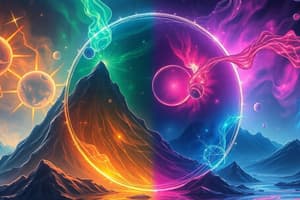Podcast
Questions and Answers
Which state of matter has a definite volume but no definite shape?
Which state of matter has a definite volume but no definite shape?
- Liquid (correct)
- Solid
- Plasma
- Gas
What occurs during the process of vaporization?
What occurs during the process of vaporization?
- Gas turns into liquid
- Solid turns into gas
- Liquid turns into gas (correct)
- Energy is released
Which term describes the process of a gas turning directly into a solid?
Which term describes the process of a gas turning directly into a solid?
- Sublimation
- Melting
- Freezing
- Deposition (correct)
Which of the following is an example of a physical property?
Which of the following is an example of a physical property?
During which phase change does energy get absorbed?
During which phase change does energy get absorbed?
What is the main characteristic of particles in a gas?
What is the main characteristic of particles in a gas?
What is released during the freezing process?
What is released during the freezing process?
Which of the following changes involves an irreversible process?
Which of the following changes involves an irreversible process?
What is a characteristic of plasma?
What is a characteristic of plasma?
Which change occurs when gas cools and forms a liquid?
Which change occurs when gas cools and forms a liquid?
Flashcards are hidden until you start studying
Study Notes
Properties of Matter
States of Matter
-
Solid
- Definite shape and volume.
- Particles are tightly packed and vibrate in place.
- Examples: Ice, wood, metals.
-
Liquid
- Definite volume but no definite shape.
- Particles are close together but can flow past each other.
- Examples: Water, oil, mercury.
-
Gas
- No definite shape or volume.
- Particles are far apart and move freely.
- Examples: Oxygen, carbon dioxide, helium.
-
Plasma
- Ionized gas with free-moving ions and electrons.
- Conducts electricity and is affected by magnetic fields.
- Examples: Stars, lightning, neon signs.
Changes in States
-
Melting
- Solid to liquid; occurs at the melting point.
- Energy is absorbed.
-
Freezing
- Liquid to solid; occurs at the freezing point.
- Energy is released.
-
Vaporization
- Liquid to gas; can occur through boiling or evaporation.
- Energy is absorbed.
-
Condensation
- Gas to liquid; occurs when gas cools.
- Energy is released.
-
Sublimation
- Solid directly to gas without becoming liquid.
- Energy is absorbed.
- Examples: Dry ice, iodine.
-
Deposition
- Gas directly to solid without becoming liquid.
- Energy is released.
- Examples: Frost forming on surfaces.
Physical vs Chemical Properties
-
Physical Properties
- Can be observed or measured without changing the substance's composition.
- Examples: Color, density, boiling point, melting point, solubility.
-
Chemical Properties
- Describe a substance's ability to undergo chemical changes.
- Indicate how a substance reacts with others.
- Examples: Flammability, reactivity with acids, oxidation states.
-
Key Differences
- Physical properties can be reversible (e.g., melting and freezing).
- Chemical properties often involve irreversible changes (e.g., burning, rusting).
States of Matter
- Solid: Characterized by a definite shape and volume; particles are tightly packed and vibrate in fixed positions. Common examples include ice, wood, and metals.
- Liquid: Has a definite volume but no definite shape; particles are close together yet have the ability to flow around each other. Examples include water, oil, and mercury.
- Gas: Lacks both definite shape and volume; particles are spread far apart and move freely. Common gases include oxygen, carbon dioxide, and helium.
- Plasma: An ionized state of matter where free-moving ions and electrons exist; conducts electricity and responds to magnetic fields. Found in stars, lightning, and neon signs.
Changes in States
- Melting: Transition from solid to liquid at the melting point, involving absorption of energy.
- Freezing: Conversion from liquid to solid at the freezing point, accompanied by the release of energy.
- Vaporization: Transformation from liquid to gas, occurring through processes like boiling or evaporation; energy is absorbed.
- Condensation: Change from gas to liquid, primarily when gas cools, resulting in energy release.
- Sublimation: Direct conversion from solid to gas without passing through a liquid phase; energy is absorbed. Examples include dry ice and iodine.
- Deposition: Direct change from gas to solid without the liquid phase; energy is released. A common example is frost formation.
Physical vs Chemical Properties
- Physical Properties: Observable or measurable characteristics that do not change the substance's composition; includes color, density, boiling point, melting point, and solubility.
- Chemical Properties: Characteristics describing a substance's potential to undergo chemical changes; indicate reactivity and interactions with other substances such as flammability and oxidation states.
- Key Differences: Physical properties can often be reversed (e.g., melting and freezing), while chemical properties typically involve irreversible changes (e.g., burning and rusting).
Studying That Suits You
Use AI to generate personalized quizzes and flashcards to suit your learning preferences.




